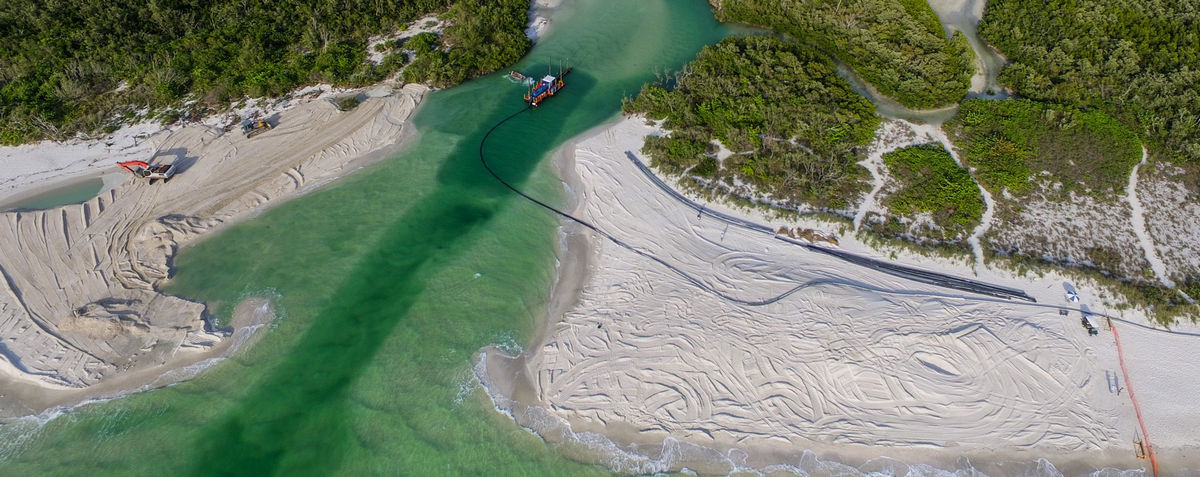Program Mission: Protecting coastal resources and the public’s common interest through strategic planning, coordination, and the permitting of projects.
The Beaches, Inlets and Ports Program (BIPP) processes Joint Coastal Permit (JCP) applications (not Coastal Construction Control Line permit applications) as well as Environmental Resource Permit (ERP) applications for navigational dredging of deepwater ports and inlets.
BIPP reviews these projects to make sure that any potential adverse impacts have been avoided or minimized, and that the projects meet the criteria for issuance that are specified in statutes and rules.
Once a permit has been issued, the department monitors the progress of the project to confirm that there have been no unacceptable impacts.
View Pending Applications, Issued Permits, Expired Permits and Projects Under Construction
Joint Coastal Permitting
On Oct. 13, 1995, the Florida Department of Environmental Protection implemented section 161.055, Florida Statutes, initiating concurrent processing of applications for coastal construction permits, environmental resource permits and sovereign submerged lands authorizations. These permits and authorizations, which were previously issued separately and by different state agencies, have now been consolidated into a joint coastal permit, or JCP.
The consolidation of these reviews and the assignment of responsibility into a single program has eliminated the potential for conflict between permitting agencies and helped ensure that reviews are conducted in a timely manner.
A JCP is required for activities that meet all of the following criteria:
- Located on Florida’s natural sandy beaches facing the Atlantic Ocean, the Gulf of Mexico, the Straits of Florida or associated inlets.
- Activities that extend seaward of the mean high water line.
- Activities that extend into sovereign submerged lands.
- Activities that are likely to affect the distribution of sand along the beach.
Activities that require a JCP include beach restoration or nourishment; construction of erosion control structures such as groins and breakwaters; public fishing piers; maintenance of inlets and inlet-related structures; and dredging of navigation channels that include disposal of dredged material onto the beach or in the nearshore area.
Beach restoration and renourishment have been the main methods of managing beach erosion and maintaining beach habitat. However, BIPP also evaluates innovative technologies that might be more effective, less costly and less likely to cause adverse impacts.
Applicants wishing to test a new technology (as an experimental JCP) are encouraged to schedule a pre-application consultation with program staff to see if similar methods have already been tested, consider adverse impacts and discuss the theoretical potential to solve an erosion problem. Experimental projects require a reliable experimental test plan to determine the success or failure of the technology.
Key rules and statutes that govern JCPs include:
- Chapter 161, F.S.
- Chapter 62B-41, Florida Administrative Code
- Chapter 62B-49, F.A.C.
- Chapter 18-20, F.A.C.
- Chapter 18-21, F.A.C.
- Chapter 62-4, F.A.C.
- Chapter 62-302, F.A.C.
- Chapter 62-330, F.A.C.
- Chapter 253, F.S.
- Chapter 258, F.S.,
- part IV Ch. 373, F.S.
- Chapter 403, F.S.
Environmental Resource Permitting
BIPP also processes ERPs for navigational dredging of deepwater ports. The ERP review ensures that such construction activities do not degrade water quality (such as through the loss of wetlands, improper in-water construction techniques, or discharge of inadequately treated water from dredged material disposal sites) or damage marine resources (including corals, seagrasses, mangroves, or habitat for manatees or marine turtles).
For more information on how to obtain an ERP, please visit Environmental Resource Permitting. Port projects regulated by BIPP include large-scale outer channel construction projects, such as the Miami Harbor Channel Expansion and Deepening and the Port Everglades Channel Expansion and Deepening. These types of projects often involve extensive review including modeling analysis and resource impact issues.
Key rules and statutes that govern ERPs include:
In addition to the regulatory permits discussed above, permission to use sovereign (state-owned) submerged lands is also addressed in the review process. The application for proprietary authorization (i.e., letter of consent, easement or lease) to use these lands is reviewed and granted (or denied) at the same time the JCP or ERP application is reviewed and issued (or denied).
Key rules that govern state lands authorizations include Chapter 18-20, F.A.C., and Chapter 18-21, F.A.C.
Resource Review
BIPP includes a reviewing team composed of resource experts (mangrove, seagrass and hardbottom) to review and analyze JCP and ERP projects with resource impacts and potential resource impacts.
The group provides consistent review of projects, including development of appropriate methodologies for resource monitoring and mitigation, and a thorough evaluation of data and reports submitted for these projects. Additionally, they provide in-water compliance evaluation of resources.
Strategic Planning and Coordination
BIPP provides coordination, planning and support in the development of the Strategic Beach Management Plan and Inlet Management Plans that help maintain consistency in permitting and funding. The Strategic Beach Management Plan is a statewide beach management plan that includes beach and inlet management strategies, critical erosion designations, and the history of the managed beach projects throughout the shorelines of Florida.
Inlet Management Plans evaluate each improved inlet and recommend actions to mitigate adverse impacts on adjacent beaches and maintain a balanced sediment budget. BIPP writes and updates the Annual Inlet Report. Additionally, BIPP provides coordination, planning and support in the development of Erosion Control Lines (ECL), which defines the property boundary between sovereign submerged land and upland ownership.
BIPP also acts as the lead coordinator for federal agency coordination on Coastal Zone management reviews and provides support for storm response activities, including site inspections and report writing assistance. BIPP manages special projects such as the Palm Beach Island Beach Management Agreement, a pilot regional perpetual management agreement between DEP, the Florida Fish and Wildlife Conservation Commission, the town of Palm Beach and Palm Beach County that includes six projects on Palm Beach Island. Regional management is expected to result in efficiencies and better beach management.
Compliance Assurance
Provide the regulated community with compliance assistance and coordinates enforcement activities of permits when necessary.


